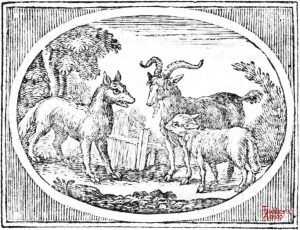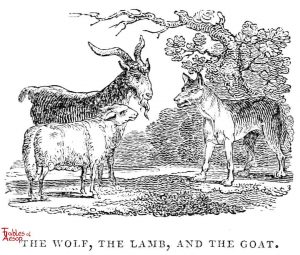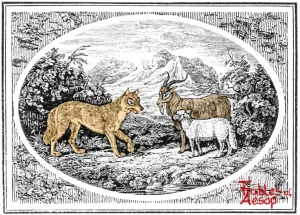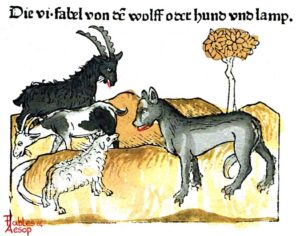A Lamb was following a Goat when a Wolf tried to get him alone by chiding him for leaving his mother to follow a Goat. Lamb saw through the ruse and lived.
Trust your parents over you enemy.

Samuel Croxall (The Lamb brought up by a Goat)
A WOLF meeting a Lamb one day, in company with a Goat; Child, says he, you are mistaken, this is none of your mother, she is yonder, (pointing to a flock of sheep at a distance.) It may be so, says the Lamb; the person that happened to conceive me, and afterwards bore me a few months in her belly, because she could not help it, and then dropt me, she did not care where, and left me to the wide world; is, I suppose, what you call my mother; but I look upon this charitable Goat as such, that took compassion on me in my poor, helpless, destitute condition, and gave me suck; sparing it out of the mouths of her own Kids, rather than I should want it. But sure, says he, you have a greater regard for her that gave you life, than for any body else. She gave me life! I deny that. She, that could not so much as tell whether I should be black or white, had a great hand in giving me life to be sure; but; supposing it were so, I am mightily obliged to her truly for contriving to let me be of the male-kind, so that I go every day in danger of the butcher. What reason then have I to have a greater regard for one to whom I am so little indebted for any part of my being, than for those from whom I have received all the benevolence and kindness which have hitherto supported me in life.
THE APPLICATION
It is they whose goodness makes them our parents, that properly claim our filial respect from us, and not those who are such only out of necessity. The duties between parents and their children are relative and reciprocal. By all laws, natural as well as civil, it is expected that the parents should cherish and provide for the child, till it is able to shift for itself; and that the child, with a mutual tenderness, should depend upon the parent for it’s sustenance, and yield it a reasonable obedience. Yet, through the depravity of human nature, we very often see these laws violated, and the relations be fore-mentioned treating one another with as much virulence as enemies of different countries are capable of. Through the natural impatience and protervity of youth, we observe the first occasion for any animosity most frequently arising from their side: but, however, there are not wanting examples of undutiful parents: and, when a father, by using a son ill, and denying him such an education and such an allowance as his circumstances can well afford, gives him occasion to withdraw his respect from him, to urge his begetting of him as the sole obligation to duty, is talking like a silly, unthinking dotard. Mutual benevolence must be kept up between relations, as well as friends; for, without this cement, whatever you please to call the building, it is only a castle in the air, a thing to be talked of, without the least reality.

Thomas Bewick (The Lamb Brought Up by a Goat)
A Wolf, prowling about for his prey, espied a Lamb sucking a Goat. You silly creature! says he, you quite mistake; this is not your mother; she is yonder among a flock of sheep: do allow me to conduct you to her. No, no, replies the Lamb, the mother that bore me may indeed be yonder; but when she dropped me, she shewed no further care, but left me unprovided for, to shift for myself, regardless of what might become of me; and had it not been for the kindness of this honest Goat, who took compassion upon my helplessness, I must have suffered all the miseries to which inexperienced youth and innocence are exposed, when left without a guide to the mercy of the world.
APPLICATION.
This Fable is levelled at those parents, too often met with in society, who, through negligence or ignorance of their duty, suffer their offspring to grow up to maturity, without instilling into their minds a single good principle of morality, or a reverence for religion, to guide them through life, and to guard them from falling into the snares of every wolf who may seek their destruction. Others again, more abandoned indeed, and callous to the tender ties of nature, bring forth an offspring whom they neither cherish nor provide for. Such a description of persons are not fit to become parents, and they must not be surprized, if their want of parental affection produce a corresponding want of filial attachment and respect: for the duties between parents and children are reciprocal. It is the goodness of parents which chiefly entitles them to the respect due to that name; and it is a paramount duty of children to honour, obey, and revere such parents as fulfil the obligations which the laws of God and nature impose upon those who bring children into the world.
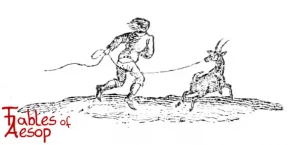

L’Estrange version
As a lamb was following a goat, up comes a wolfe, wheedling, to get him aside, and make a breakfast of him: Why what a fool art thou, says the wolfe, that may’st have thy belly full of sweet milk at home, to leave thy mother for a nasty stinking goat! Well, says the lamb, but my mother has placed me here for my security; and you’d fain get me into a corner, to worry me. Pray’e, which of the two am I to trust to now?
Moral
Where there’s the order of a parent on the one side, and the advice of an ill man, and a professed enemy, on the other, in opposition to that command; disobedience would be undoubtedly the ready way to destruction.

Heinrich Steinhöwel (Of the Lamb and the Wolf)
